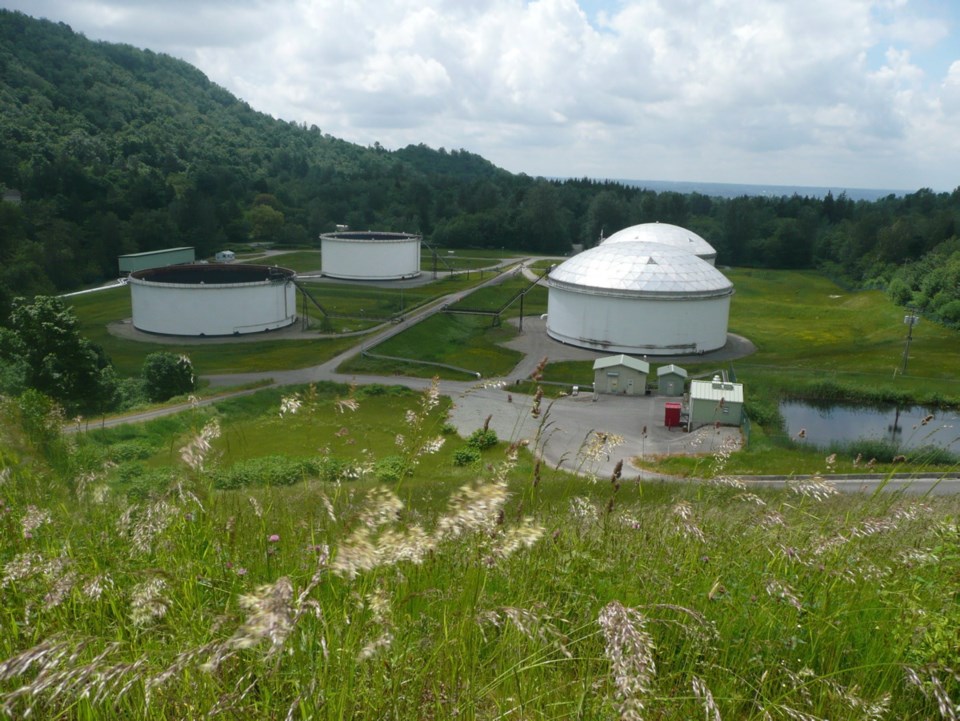So, what happens to Vancouver Island if Alberta turns off the fuel taps?
Short answer: Let’s hope we don’t find out.
Longer answer: It probably won’t happen, but if it does we could see anything from a short-term price bump to an actual gas shortage.
Alberta passed legislation last week giving itself the right to tell railroads, truckers and pipeline operators when and how much oil and gas they can ship to B.C. from that province. B.C. sued in response, saying Alberta was acting unconstitutionally.
Jason Parent, vice-president of the Kent Group, an Ontario-based petroleum industry consultancy, figures Alberta knows it is on shaky legal ground, so doubts it will actually act on its threats. “Whether that would ever happen, we’re a long way from finding out.”
Analyst Dan McTeague of GasBuddy.com isn’t so sure. “I don’t know what’s going to happen.”
As it stands, Vancouver Island is as reliant on Alberta fuel as everyone else in B.C. The gas we pump into our cars mostly comes from the Lower Mainland, mostly on one of the football-field-long fuel barges that, a few times a week, pull up at one of a handful of terminals on Vancouver Island. Shell has a tank farm near Chemainus, while Imperial Oil (Esso) and Suncor (Petro-Can) have terminals in Nanaimo, their fuel coming mainly from refineries in Alberta. Parkland Fuel’s terminals at Port Hardy and at Hatch Point at Cobble Hill are supplied primarily from the company’s Burnaby refinery, which relies on feedstock piped from Alberta.
That refinery is one of only two in British Columbia. Together, Parkland’s 55,000 barrels-per-day facility and Husky’s 15,000 BPD Prince George operation supply a little over a third of the 200,000 barrels of refined products — gasoline, diesel, jet fuel — consumed in B.C. each day.
About half of B.C.’s fuel comes from Alberta, whether by truck, train or through the Trans Mountain pipeline. On average the pipeline, which can move batches of different products at different times, carries 50,000 barrels a day of refined stuff.
The balance of the fuel we consume comes from international sources, mostly the five Washington state refineries whose combined capacity is greater than all of Alberta’s. Of their exports to B.C., a bit comes straight to the Island but most gets routed through the Lower Mainland.
How all that would be affected comes down to whether Washington state’s refineries have enough capacity to fill B.C.’s needs — and the answer to that question comes down, in part, to whether Alberta chokes off the supply of crude to Washington as well as to B.C.
As it is, a little more than half of everything that moves through the Trans Mountain pipeline from Alberta, roughly 150,000 barrels a day, is crude that gets diverted to those Puget Sound refineries via a spur line at Sumas. That’s about a quarter of the Washington refineries’ feedstock.
Would Alberta attempt to limit that? It’s one thing to turn the screws on B.C. It’s something else to try to muscle the U.S.
Even if they don’t lose their supply of crude, McTeague figures Washington’s refineries are already too busy to fill the gap should Alberta cut off B.C. “Availability of refined product is tight as a drum.”
The price of gas is chronically higher in the Pacific Northwest than the rest of the U.S., higher even than the Midwest, Gulf Coast or California.
Note that in April, when technical issues left Washington refineries scrambling to supply customers, the Lower Mainland received not only 520,000 barrels of fuel from Puget Sound but another 250,000 to 300,000 from Singapore and 20,000 from Indonesia, McTeague said.
But that last bit also reinforces the view of Parent, who says geography favours coastal B.C., which could be fairly readily supplied with gas from Puget Sound, California, or even Asia. “The Pacific basin is flush with refined product.”
That would be a “marginal” price increase as supply issues are sorted out, he said. How much? “I would say no more than five to 10 cents a litre, though that’s a bit of a guess because there are a lot of moving parts.”
Parkland said in a statement that it is confident it would be able to supply customers’ needs with minimal disruption. “Dependent on the level of restrictions put in place by the Alberta government, Parkland would seek to import alternative supply and/or product, predominantly via marine shipments from the United States and other markets.”
However, it also issued a warning: “If the Alberta government restricts oil shipments to British Columbia, the overall market would be challenged near term to fully supply the region through marine importation.”
Also: “Should Trans Mountain pipeline supply be significantly reduced, market supply shortages are probable.”
Again, let’s hope it doesn’t come to that.



